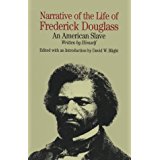If you proclaim an interest in the Civil War, there are a few books that it is assumed you have read. At the top of that list is Narrative of the Life of Frederick Douglass: An American Slave. One of the best known slave narratives, this autobiographical book packs a big punch in fewer than 100 pages.
At its most basic level, it tells the story of Frederick Douglass’s life in slavery and his escape from it. He details brutality at the hands of some masters and consideration at the hands of others. He tells about times of abundance and times of scarcity. He tells of the tasks he was set to do and those which he chose for himself, often, like his Sabbath School classes, in secret. If this was all that was in this book, it would be enough. But the book also contains a significant amount of subtext that challenges the status quo of Antebellum America. Douglass is a master story teller using classic literature and the Bible to deliver an abolitionist sermon, especially aimed at northern Christians who were turning a blind eye to slavery. In fact, one of the overriding themes of this work is that Christianity is an aggravating factor in slavery, not a mitigating one. The masters who most conspicuously proclaimed themselves Christians were the worst masters. Further, Douglass's subtitle to this work--An American Slave--was, I believe, an intentional choice meant to claim the sin of slavery for the entire nation. Everyone--northerners and southerners, slave holders and free-labor proponents, Christians and non-Christians alike--were complicit in slavery. No one's hands were clean. The impact slavery has on the enslaved is the central theme to many studies of the time, but in the person of Sophia Auld, Douglass illustrates the impact slavery has on the enslavers. When he first meets her, Douglass describes Sophia as “a woman of the kindest heart and finest feelings. She had never had a slave under her control previously to myself, and prior to her marriage she had been dependent upon her own industry for a living.” He claimed to be “astonished by her goodness.” Sophia taught Douglass the alphabet and the rudiments of reading. When her husband, Douglass’s master Hugh Auld, discovered this, he put an immediate stop to it. “If you give a n-- an inch, he will take an ell. A n-- should know nothing but to obey his master--to do as he is told to do. Learning would spoil the best n-- in the world. Now, if you teach that n-- how to read, there would be no keeping him. It would forever unfit him to be a slave. He would at once become unmanagable and of no value to his master. As to himself, it could do him no good, but a great deal of harm. It would make him discontented and unhappy.” Douglass notes that from that moment on, Sophia Auld began to lose those qualities--piety, warmth, charity and tenderness--that had so thrilled Douglass upon his first meeting her. Her heart grew hard. Douglass even acknowledges, “Slavery proved as injurious to her as it did to me.” Hugh Auld’s lecture to his wife also introduces another central theme: slavery was more than simply bondage of the body. It was bondage of the mind. Douglass understood from that moment on that education was the key to true freedom. Hugh Auld was right. Education would make him discontent and unhappy. Douglass would spend the rest of his childhood as a slave bartering what he could with local boys to get them to teach him to read. When he had nothing to barter, he would dupe those same boys into teaching him by issuing challenges he knew the boys couldn’t ignore. Once he knew how to read, he organized secret Sabbath Schools to help other slaves gain the education that had so discontented Douglass. The original Preface, written by William Lloyd Garrison, can be a barrier. Garrison wrote like someone who liked to hear himself talk. His writing is bombastic in the formal and rather overblown language of orators of the time, and Douglass’s clear and concise writing is a welcome read after the multipage Preface. There are many editions of this book. While the main body’s text will remain the same, some editions provide additional information that will help provide context and further understanding of this deceptively complex work. I read a 1993 edition edited by David Blight. Blight’s footnotes and the supplemental materials highlight the rich literature Douglass drew upon to write his autobiography, and give a glimpse into his subsequent public work. While this particular text is out of print, it can be found used on Amazon and abebooks.com.
0 Comments
Leave a Reply. |
AuthorToni is a wife, mom and history buff who loves bringing the Civil War to life for family members of all ages. Archives
July 2018
Categories
All
|

 RSS Feed
RSS Feed